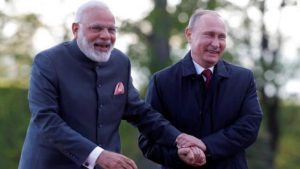Modi-Putin meet: How India, Russia balance US-China domination

Source-indiatoday.in
hen top leaders of two major powers meet, it is never a bilateral affair. It becomes an event of geostrategic significance. The meeting between Russian President Vladimir Putin and Prime Minister Narendra Modi is one such event.
India and Russia recognise each other as strategic partner through an agreement first inked in 1970s and then reaffirmed in early 2000s. They have given a multi-polar shape to geostrategic engagement of the major powers.
India and Russia have been the balancing force in this realignment of global powers. With Vladimir Putin and Narendra Modi seem to have a personal rapport, they are in a position to influence geostrategic politics – with regard to sanctions on Iran, the Middle East equation, tariff manipulations, terrorism and several other issues.
The India visit of Putin would mark the fifth meeting with Modi since annual bilateral summit in June last year, when the prime minister travelled to Russia. This meeting was followed by meetings in Astana, Kazakhstan and Hamburg, Germany for G20 summit.
Moreover, Narendra Modi travelled to Sochi in May this year for an informal summit with Vladimir Putin. The visit was undertaken to smoothen India-Russia relations further.
This was necessitated as the ties between the two countries were dwindling with trade slipping below $10 billion after 2014. India looked closer to the US and Russia was seen favouring Pakistan and China.
Overall, Russia has supported India’s demand for a permanent seat at the UN Security Council. Russia also helped India attain full membership of the Shanghai Cooperation Organisation (SCO).
It has also batted for India’s entry into the exclusive club of the Nuclear Suppliers Group (NSG) even though New Delhi does not intend to sign the Non-proliferation Treaty (NPT), a mandatory condition for membership.



